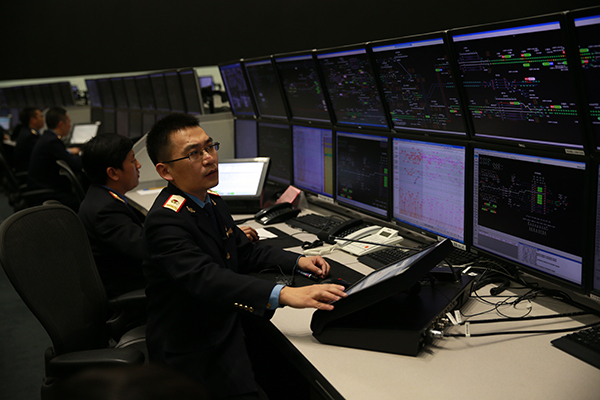 |
|
Zhang Bo(right), 34, train conductor at Beijing railway administration, stares at a monitor to track status of trains on Feb 2, 2015. [Photo by Zou Hong/China Daily] |
Zhang Bo's first childhood glimpse of a whistling stream train approaching the station in his hometown set the trajectory for his life.
"The power, the sound was overwhelming, and yet fascinating, for a 9-year-old boy," he said. "After that, I started to sneak out of my house and school to watch trains, and later my enthusiasm led me to my career."
As a conductor at the Beijing railway administration, Zhang, now 34, has been dispatching high speed trains between Shanghai and Beijing for five years.
The position on one of China's busiest railways means Zhang said his two colleagues are constantly busy.
They barely have time to take a sip of water during working hours, and must take turns to use the restroom.
"Trains are traveling over a speed of 300 kilometers an hour. There should always be at least one person to watch them and keep them running safely," Zhang said from the Beijing conducting hall, which is the largest such hall in Asia at more than half the size of a soccer field.
Extreme weather provides the biggest challenge for dispatchers, Zhang said. During a blizzard or gale, conductors must contact train engineers to slow down or stop, and rearrange timetables for trains that are behind schedule.
Facing a wall of monitors, Zhang said he can track the location, speed and status of all trains in the system. "Passengers can't see us, but our work is closely related to their trip, to whether they arrive or depart on time," he said.
Zhang said he will be working during the upcoming Spring Festival as he did for the past five years in order to keep train traffic flowing smoothly and safely for all of those heading home for the Lunar New Year. After the holiday travel rush, he will visit his wife and 6-year-old daughter in Hebei province.
As a child, Zhang had memorized the map of China's railway. But in recent years, the network is expanding rapidly, he said.
His own train back to his hometown of Hengshui in Hebei takes more than three hours, but he hopes it will be a shorter trip one day. "There hasn't been high speed train from Beijing to my hometown," he said. "But I believe there soon will be one connecting Beijing to my home."
